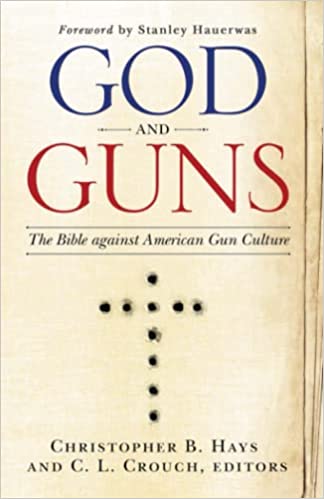Brent Strawn, a friend and colleague who formerly taught at Asbury with me, and then at Candler, and now is Professor of OT at Duke Divinity School has written the first major essay in this volume about the various ways people have interpreted Joshua, sometimes even as a justification for God’s people to do violence to other human beings. The title of his chapter is “Projecting on Joshua: You Cannot Worship both God and Glock”. The major point of the early part of his chapter is that we live in a far more violent time and age than did Joshua (not least because they had no guns, or other weapons of mass and instant destruction of human life) and so the attempt by moderns to criticize the OT, and in particular the Holy War texts found in places like Joshua is an example of projection, projection of our own modern violent tendencies onto the OT, sometimes in order to condemn the OT and its God as primitive and unacceptable, when in fact we are no more, if not less civilized and less Biblical than they. He has a point. The writers of the OT could hardly have imagined a world in which people would rather uphold the 2nd amendment than live out the second commandment. They could hardly have imagined a world in which watching violence on TV or at the movies, much less playing violent games, even with one’s children, was seen as a normal and acceptable form of behavior. It is a fair and open question as to which civilization is more barbaric— theirs or ours.
Strawn freely admits of course that there are violence passages in the OT, and even commandments to do violence against Canaanites or Amorites in various places in the early part of the OT. But even these texts, as he notes, fall far short of ethnic cleansing commandments, not least because in the same context there are exhortations about not intermarrying with Canaanites, which hardly has to do with marrying dead people. In other words, even the ‘harem’ or ban apparently was not targeted at all of a particular ethnic group. Indeed, I would say it is dealing with a specific problem that begins with Gen. 6.1-4— the production of the nephilim, and God’s prohibition of that particular kind of cross-breeding between angels and human women. But you can hear more about that in my review of Mike Heiser’s books in previous years on this blog.
Where I would differ with Brent is that while both testaments absolutely problematize violence and deal with the problem, they do so in different ways. In the teachings of Jesus and Paul violence by followers of Jesus is forbidden, whereas in the OT it is just curtailed and limited. I would also differ with him about the violence in the book of Revelation which frankly does not have to do with human conduct, but rather with divine judgment of various sorts. As for the advice given in Revelation to disciples it is not ‘let’s get ready to rumble’ it is rather ‘leave justice and judgment in God’s hands, and be prepared to suffer and possibly be martyred for the faith. The Book of Revelation does not justify violence by followers of Jesus at all.
Strawn however rightly points out that in America the problem of violence with guns is largely a white male problem, and I would add a police problem of sometimes using deadly force when the situation did not require it, usually against black males many of whom were not armed. This is where the Black Lives Matter marches have a valid point. And he makes some useful points about the psychology of having guns— namely it gives persons a largely false sense of security and also of power. As the statistics show, a citizen with a gun is far more likely to shoot someone who is not an intruder or criminal and not someone trying to steal their property, namely they are more likely to shoot members of their own family, or innocent third parties, including their neighbors and even school children. And definitely behind all this is fear— fear of being harmed. And for Christians fear should never be the basis for making major decisions, especially life and death decisions, in this life. That whole attitude is the opposite of the ‘why not rather be wronged, than wrong another’ teaching of the NT.













